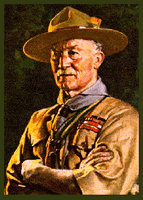
Lord Robert Baden-Powell of Gilwell (1857-1941) was a decorated soldier, talented artist,
actor and free-thinker. Best known during his military career for his spirited defense of the small South
African township of Mafeking during the Boer War, he was soon to be propelled to extraordinary fame as the
Founder of Scouting.
He had been impressed during the siege at how boys had used their initiative under pressure to make
themselves useful and capitalize on limited resources. Already thinking of developing a training programme
for young people Britain, he was urged by friends to re-write his handbook for soldiers (Aids to Scouting)
for this younger audience.
In 1907 he held an experimental camp on Brownsea Island, Poole, Dorset, to try out his ideas. He
brought together 20 boys, some from public schools and some from working class homes, and put them into camp
under his leadership. The whole world now knows the results of that camp.
Scouting for Boys was published in 1908 in six fortnightly parts at 4d a copy. Sales of the book
were enormous and boys soon formed themselves into Scout Patrols. What had been intended as a training aid
for existing organizations became the handbook of a new and, ultimately, worldwide Movement. B-P's great
understanding of young people obviously touched a fundamental chord both in this country and others. In
September 1908, B-P set up an office to deal with enquiries pouring in about the Movement.
Scouting for Boys has since been translated into many different languages and dialects. Some 28 million
young people worldwide now take part in the adventure of Scouting and in 2007 the
Movement celebrates its centenary.














